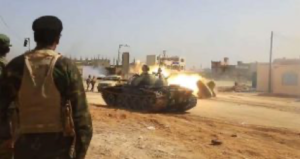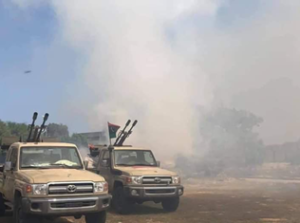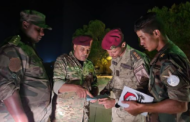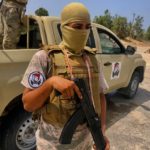Khalifa Haftar’s forces, said they had seized control of most areas in Sirte after brief clashes with Sirte Protection and Security Force units.
In Tripoli, early reports suggest that Tripoli’s midnight ceasefire is holding. A straw poll through telephone calls this morning by Libya Herald suggests that both sides were – at the time of publication – respecting the ceasefire.
On the international level, the embassies of France, Germany, Italy, the United Kingdom, the United States, and the Delegation of the European Union said in a statement on January 12 that they join the UN Support Mission for Libya in welcoming the acceptance by parties in Libya of a ceasefire on January 12.
SIRTE
- twenty of Gen. Khalifa Haftar’s militia were killed in the Al-Washaka area, in the past days, a spokesperson of the UN-recognized Libyan government said on January 8, Anadolu reports. Mustafa al-Majee said the militia were targeted by airstrikes and a number of armed vehicles and ammunition were destroyed. The Al-Washaka area, east Sirte, saw heavy clashes and Government of National Accord (GNA)’s forces are controlling and advancing despite the clashes [Marsad, 08.01.2020];

- Khalifa Haftar’s forces, backed by former Gaddafi brigades, said they had seized control of most areas in Sirte after brief clashes with Sirte Protection and Security Force units, which pulled out after being abandoned by Brigade 604 – a Madkhali force that was formed after the city was freed from ISIS in 2016. For weeks, Haftar’s forces have been launching sporadic attacks on Sirte with several air attacks by UAE drones, which caused several deaths from the Sirte Protection and Security Force [Libya Observer, 06.01.2020].

TRIPOLI
- “the militias of the National Accord government broke the truce on more than a front with all types of weapons,” said Major-General Al-Mabrouk al-Ghezwi, commander of the Western Region Operations Group in the Libyan National Army. Al-Ghezwi added in press statements on January 12 that the LNA units on various fronts of fighting “remain committed to the orders issued to them before midnight by the LNA’s general command regarding the ceasefire, and we are awaiting any new orders from them.” [Address Libya, 12.01.2020];
- early reports suggest that Tripoli’s midnight ceasefire is holding. A straw poll through telephone calls this morning by Libya Heraldsuggests that both sides were – at the time of publication – respecting the ceasefire. The ceasefire was confirmed earlier on January 11 by the Fayez al-Sarraj-led Presidency Council in Tripoli and the Official Spokesperson for Khalifa Haftar’s forces, Ahmed Mesmari [Libya Herald, 12.01.2020];
- at least 20 gunmen of Haftar’s militia were killed and two armored vehicles were destroyed in an attack launched by the Libyan army troops in the fighting axis of Khallatat south of Tripoli, Libyan Army Spokesman, Colonel Mohammad Ganounu, has confirmed [Libya Observer, 11.01.2020].
INTERNATIONAL RELATIONS
- the embassies of France, Germany, Italy, the United Kingdom, the United States, and the Delegation of the European Union said in a statement on January 12 that they join the UN Support Mission for Libya in welcoming the acceptance by parties in Libya of a ceasefire on January 12. The embassies added that they hail the announcement that both the Presidential Council and Khalifa Haftar will halt military operations in Tripoli. “We urge the parties to seize this fragile opportunity to address the key political, economic, and security issues underlaying the conflict.” They said. [Libya Observer, 12.01.2020];

- the Russian Deputy Foreign Minister, Mikhail Bogdanov has expressed appreciation to the Government of National Accord (GNA) for welcoming the joint statement of the Turkish and Russian Presidents regarding the call for a ceasefire [Libya Observer, 11.01.2020];
- the Italian Prime Minister Giuseppe Conte called on January 8 on Khalifa Haftar to halt his offensive on Tripoli. Conte, in a meeting with Haftar in Rome, expressed concern over the continuing escalation in Libya and condemned the airstrike on Tripoli Military College [Libya Observer, 09.01.2020];
- the Head of the United Nations Support Mission in Libya (UNSMIL), Ghassan Salame, welcomed on January 8 recent calls for a ceasefire in Libya by a number of countries and international and regional organizations, including the joint call by the Presidents of Turkey and Russian [Libya Observer, 09.01.2020];
- France, Greece, Egypt and Cyprus have condemned deals signed between Turkey and Libya’s United Nations-recognised government assigning Ankara rights over a vast area of the eastern Mediterranean. A statement issued on January 8 by the foreign ministers of the four countries, after a meeting in Cairo, declared the agreements “null and void” and said they undermined regional stability [Marsad, 09.01.2020];
- Germany warned of Libya becoming a “second Syria” as EU leaders met the head of the North African country’s Government of National Accord (GNA) on January 8. The warning came from German Foreign Minister Heiko Maas, who told reporters that, “We want to prevent Libya from becoming the scene of a proxy war or a second Syria.” [Marsad, 09.01.2020];
- the Turkish President Recep Tayyip Erdogan and the Russian President Vladimir Putin have urged for a ceasefire in Libya starting on January 12, calling for the resumption of the political process [Libya Observer, 08.01.2020];
- Algerian President, Abdelmadjid Tebboune has agreed with Turkish Foreign Minister, Mevlüt Çavuşoğlu to avoid any practical action that would poison the already heated atmosphere in Libya and make every effort to cease fire [Libya Observer, 08.01.2020];
- the Turkish envoy to Libya, Emrullah Işler, said his country’s troops will be sent to Libya to be a deterrence to aggressors, adding that any attacks on Turkish troops will be dealt with force [Libya Observer, 07.01.2020];
- Tunisian President, Kais Saied and German Chancellor, Angela Merkel have emphasized the need for a political solution to the Libyan crisis and the importance of engaging all countries concerned, including Tunisia, with an emphasis on upholding international legitimacy [Libya Observer, 07.01.2020];
- the Saudi Cabinet, headed by King Salman bin Abdulaziz, issued on January 7 a strong statement against Turkish military intervention in Libya, reiterating the Kingdom’s condemnation of Turkish interference in Libya [Address Libya, 07.01.2020];
- Foreign Ministers of France, Germany, Italy and UK, meeting in Brussels to discuss the Libyan crisis, stressed the necessity to avoid unilateral actions such as the signing of agreements which further exacerbate the conflict or actions which create a pretext for external interference that are contrary to the interests of the Libyan people, as well as to European interests, as underlined by the European Council conclusions of 12th December 2019 [Address Libya, 07.01.2020];
- European Union’s foreign policy chief, Josep Borrell condemned on January 6 the bombing of Tripoli Military College by Haftar’s forces. “Recent developments in Libya indicate that an escalation of violence around Tripoli may be imminent.” EU website quoted Borrell as saying [Libya Observer, 07.01.2020];
- Algeria’s president has declared Libya’s capital a “red line,” and warned “no one to cross it,” after forces loyal to military commander Khalifa Haftar reportedly shelled a military academy on the weekend, killing 30 people. During a meeting on January 6 with the head of the Tripoli-based Government of National Accord (GNA), President Abdelmadjid Tebboune said [Marsad, 07.01.2020];
- the Sudanese Ministry of Foreign Affairs expressed Khartoum’s refusal to foreign interfere in Libya. The ministry said, in a statement on January 6 that Sudan’s stance towards events in Libya is consistent with the Arab consensus, while affirming Khartoum’s support for Libya’s stability. The ministry confirmed that Sudan is committed to all Arab League decisions and rejects foreign interference in Libya [Address Libya, 06.01.2020].


























